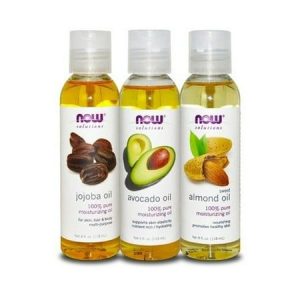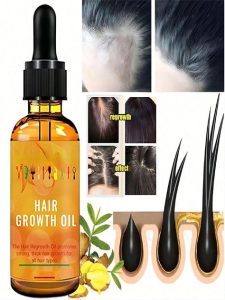
Understanding Almond Oil’s Properties
Almond oil is a lightweight oil with a mild, nutty scent. Here are some key properties that make it appealing for hair care:
Moisturizing:
Almond oil is a natural emollient, meaning it helps trap moisture in the hair shaft. This can be beneficial for dry, brittle hair.
Rich in nutrients:
Almond oil contains vitamin E, fatty acids, and other nutrients that are important for overall hair health.
Gentle:
Almond oil is considered non-comedogenic, meaning it won’t clog pores on the scalp. This makes it a good option for people with sensitive scalps.
Potential Benefits of Almond Oil for Hair
While research on almond oil’s direct impact on hair growth is ongoing, it offers several benefits that can contribute to healthy hair:
-
Reduced breakage: Almond oil’s moisturizing properties can help prevent hair from becoming dry and brittle, which can lead to breakage.
-
Improved manageability: Almond oil can help smooth the hair cuticle, making hair smoother and easier to manage.
-
Scalp health: Some people find that almond oil can help soothe a dry, itchy scalp.
-
Shine boost: Almond oil can add a natural shine to hair.
Important Considerations When Using Almond Oil
Here are some things to keep in mind when using oil for hair:
-
Patch test: Before applying almond oil to your entire scalp, do a patch test on a small area of skin to check for allergic reactions.
-
Quantity matters: A little goes a long way! Too much almond oil can weigh down hair. Start with a small amount and increase gradually as needed.
-
Hair type: Almond oil is generally suitable for most hair types. However, people with very fine hair might find it too heavy.
Using Almond Oil in Your Hair Care Routine
There are several ways to incorporate almond oil into your hair care routine:
-
Pre-shampoo treatment: Massage a small amount of almond oil onto your scalp and hair before shampooing. Leave it on for 30 minutes to an hour, then wash your hair as usual.
-
Deep conditioner: Mix a few drops of almond oil with your regular conditioner for an extra boost of moisture. Apply the mixture to your hair, focusing on the ends, and leave it on for 20 minutes before rinsing.
-
Leave-in conditioner: Apply a very small amount of almond oil to damp hair, focusing on the ends, to help tame frizz and add shine. Be mindful of using too much, as it can weigh down hair.
Natural Hair Care Beyond Almond Oil
Almond oil is just one of many natural ingredients that people use for hair care. Here are some other options to explore:
-
Coconut oil: Similar to almond oil, coconut oil has moisturizing properties and can help add shine to hair.
-
Argan oil: Argan oil is known for its richness in vitamin E and fatty acids, which can help nourish and strengthen hair.
-
Aloe vera: Aloe vera gel can help soothe an itchy scalp and add moisture to hair.
-
Apple cider vinegar: Apple cider vinegar can be used as a natural hair rinse to help detangle hair and add shine.
Remember, a healthy hair care routine goes beyond just the products you use. Eating a balanced diet, drinking plenty of water, and managing stress can all contribute to healthy hair growth.
There’s no one-size-fits-all approach to hair care. Experimenting with different natural oils and ingredients can help you find what works best for your hair type and goals. Almond oil may be a natural hair care option worth exploring, but keep in mind that it likely won’t directly accelerate hair growth. A healthy lifestyle and overall hair care routine are key to achieving strong, beautiful hair.
Understanding Hair Growth
Hair growth is a complex process influenced by genetics, hormones, and overall health. If you’re concerned about hair growth, it’s important to consult a dermatologist or trichologist (a hair and scalp specialist). They can assess your individual situation and recommend a personalized hair care plan.
Maintaining a Healthy Hair Care Routine
A healthy hair care routine can help you achieve your hair goals. Here are some tips:
-
Use gentle shampoos and conditioners: Harsh chemicals can damage hair. Look for products that are formulated for your hair type.
-
Deep condition regularly: Deep conditioning treatments can help add moisture and nourishment to hair.
-
Eat a balanced diet: Eating a balanced diet that includes plenty of fruits, vegetables, and whole grains can provide your hair with the nutrients it needs to grow strong and healthy.
-
Manage stress: Stress can contribute to hair loss. Find healthy ways to manage stress, such as exercise, relaxation techniques, or spending time in nature.
By following these tips and exploring natural hair care options like almond oil, you can create a routine that promotes healthy hair growth and overall hair health.

How to Use Almond Oil for Hair Growth
To reap the benefits of hair oil, it’s important to use it correctly. Here are a few tips:
- Warm Oil Massage: Warm the almond oil slightly and massage it into your scalp using gentle, circular motions. Leave it on for at least 30 minutes before washing it out with a mild shampoo.
- Overnight Treatment: For deeper conditioning, apply almond oil to your hair and scalp, cover your head with a shower cap, and leave it on overnight. Wash it out in the morning.
- Mix with Other Oils: Almond oil can be mixed with other beneficial oils like coconut oil, olive oil, or castor oil for enhanced effects.
- DIY Hair Masks: Incorporate almond oil into homemade hair masks with ingredients like honey, yogurt, or avocado to provide additional nourishment and conditioning.









